Welcome to the breathtaking world of Costa Rica’s underwater wonders!
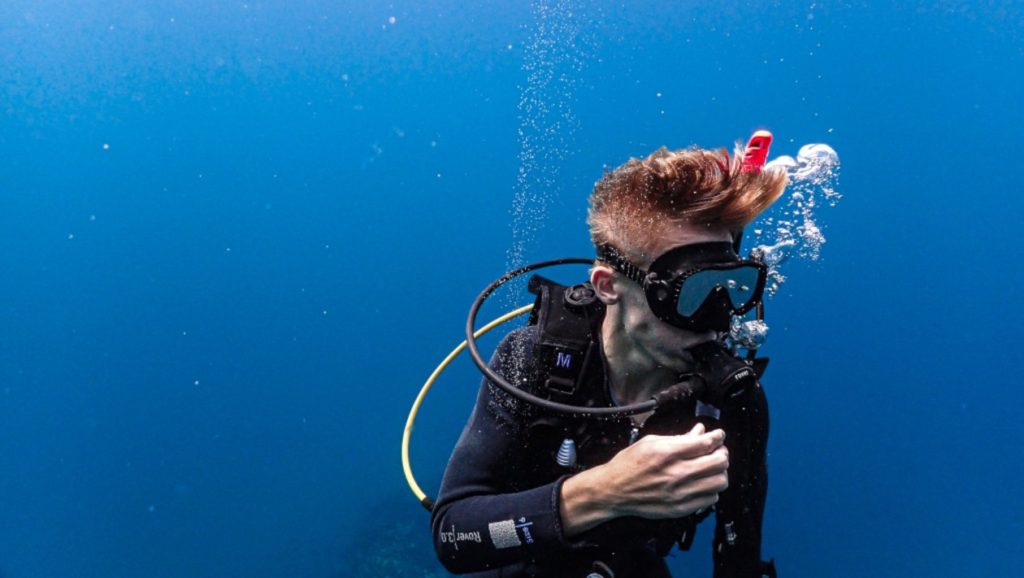
Dive and Surf
In 2024, this beautiful tropical paradise remains a popular destination for people who love diving. It has colorful marine life, clear coral reefs, and amazing underwater experiences that are hard to forget.
Whether you’re an experienced diver seeking thrilling depths or a beginner eager to explore the mesmerizing shallows, Costa Rica has it all. In this article, we will unveil the best dive spots, optimal diving conditions, and affordable prices that make Costa Rica an idyllic haven for divers of all levels. So, put on your wetsuit, grab your snorkel, and get ready to immerse yourself in a world of aquatic marvels that will leave you awe-struck and longing for more!
Costa Rica is famous not only for the variety of its ecosystems, but also for the charm and biodiversity of its underwater life.
Located in Central America, it offers us a unique opportunity to get to know while diving, the imposing coral reefs, aquatic animals in a variety of the greatest diving destinations.
Where are the best diving spots located in Costa Rica?
The best places to practice diving in Costa Rica are in the Pacific. They are the Catalina Islands, Bat Islands, Cocos Island and Caño Island.
Among these, Isla del Caño is the most recommended dive site because the price of diving there is affordable, the place is incredible and does not require advanced diving licenses.
In addition, it is closer to the capital, and the amount of marine life that can be seen is truly impressive.
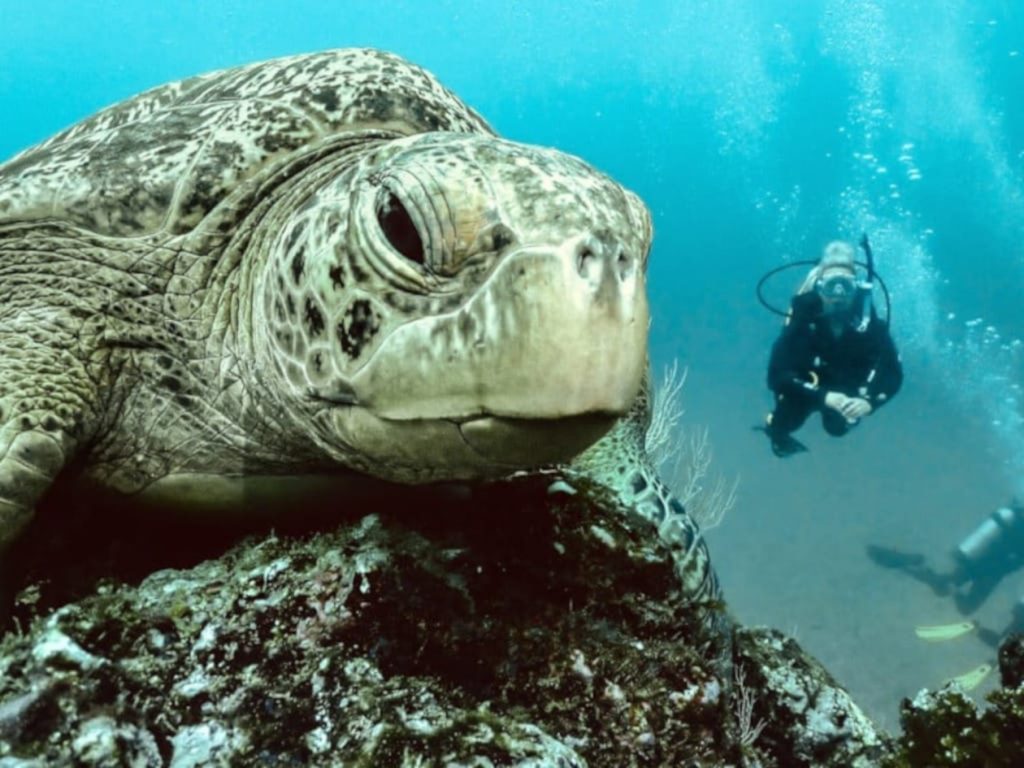
Explore diving in Costa Rica
Although the country has only 54,100 square kilometers, it is home to many protected areas and national parks, both terrestrial and underwater. Costa Rica dedicates more than 25% of its territory to the protection of ecosystems.
The Pacific coast is also well known for its rich marine life. Manta rays, whale sharks, turtles, humpback whales are just some of the marine species that you will be able to see.
In the southern part of the country it is possible to find internationally known biological reserves, such as Corcovado National Park and Isla del Caño, which protect thousands of hectares of marine life and reefs.
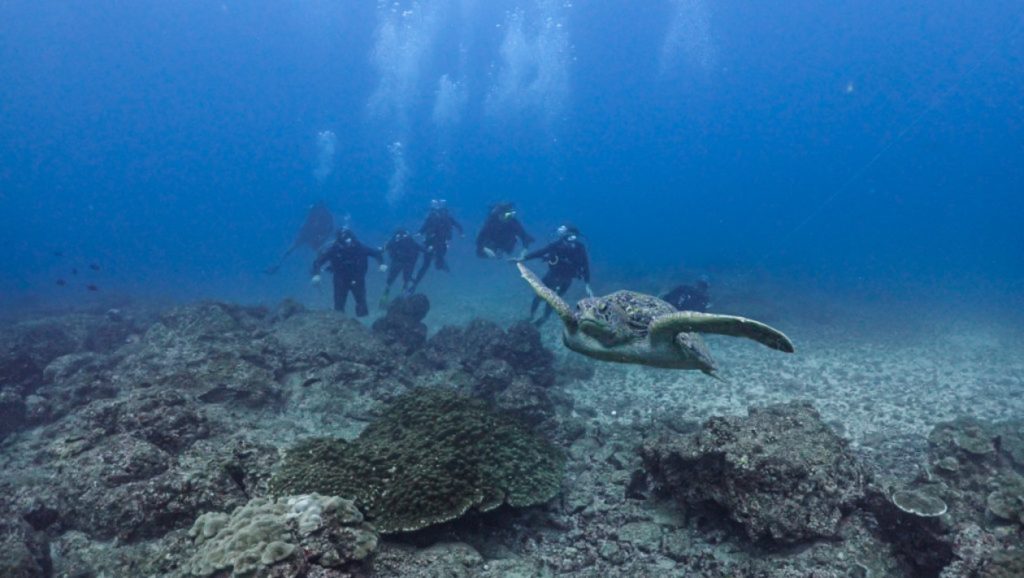
The underwater landscape formed by boulders and pinnacles makes Costa Rica an appropriate diving destination for beginners and advanced.
For this reason and for its exuberant beauty, the country is the tourist destination of more than 3 million people each year. Many of them are divers looking to enjoy the best diving places in Costa Rica.
Does Costa Rica have good scuba diving?
The answer is Yes. Costa Rica has very good scuba diving. However, it is important to know which are the best places for diving in Costa Rica and how to get to them.
This will prevent you from wasting time and money on sites that will not give you a good diving experience.
We always recommend foreign divers to connect locally with a good diving center. In Costa Rica there are more than fifty PADI dive centers along its coasts that operate at different sites.
Depending on the area in which you are vacationing, it is good that you contact one of these dive centers and join a local diving tour.
Joining a Tour will allow you have a better experience and to find the best possible places with greater security.
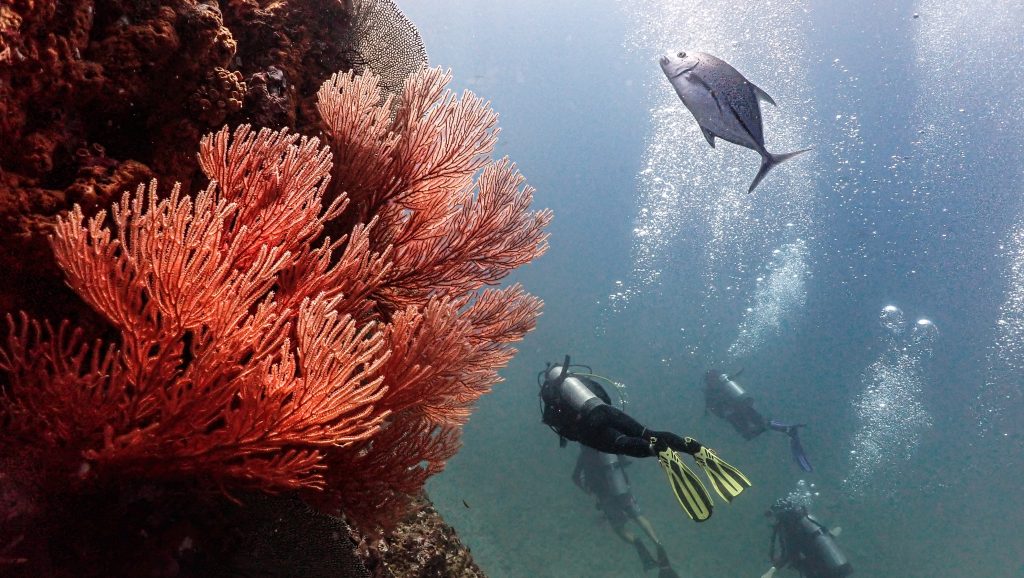
What are the least recommended places to go diving in Costa Rica?
The least recommended sites for diving are those that are close to the beaches, such as Herradura, Jacó and Manuel Antonio.
Visibility is more limited and there are fewer things you can see.
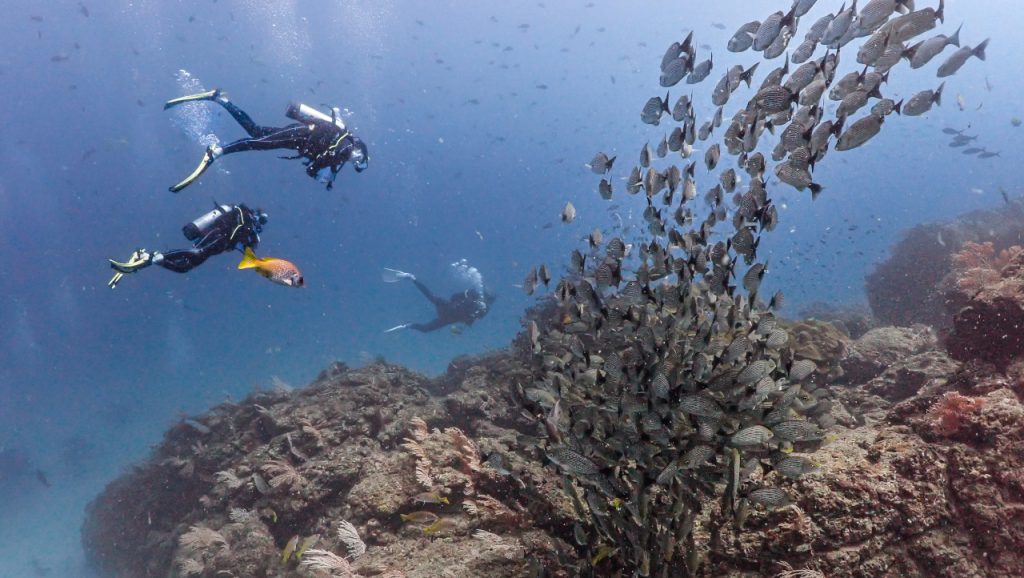
When to dive in Costa Rica?
Costa Rica is a tropical country where rain is present most of the year.
Basically two seasons can be identified, which are marked by the rainy season, visibility and the type of marine life that can be seen.
For experienced divers
The rainy season, from May to November, is recommended for advanced divers who want to experience pelagic marine life.
Due to the abundance of nutrients during these months, it is the best time to see the Bull Sharks in the Bath Islands, the Hammerhead sharks in the Cocos Island and the mantas and whale sharks in the Caño Island.
This season also coincides with the visit of the Humpback whales, which are abundant in the South Pacific of the country.
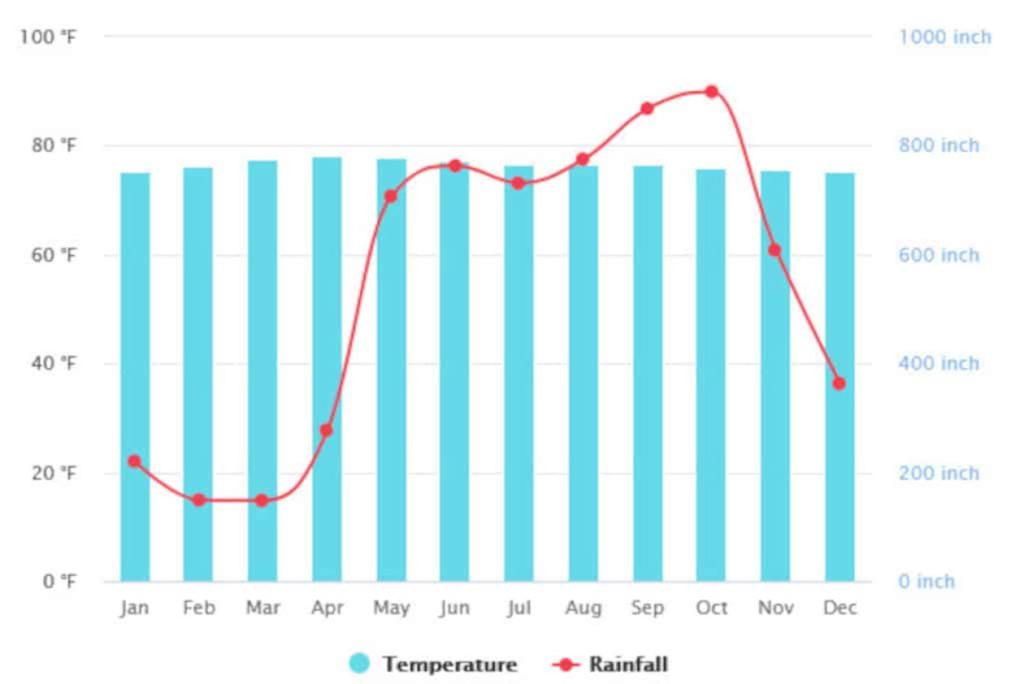
For those who prefer a quieter place
If you prefer a quieter dive and enjoy an incredible variety of fish and macro-species, the season from August to December is ideal for you.
During this season there is less wind and the sea is calmer. Visibility is much higher and can reach 100 feet (30 meters).
The currents are less intense, so you can enjoy a calmer dive.
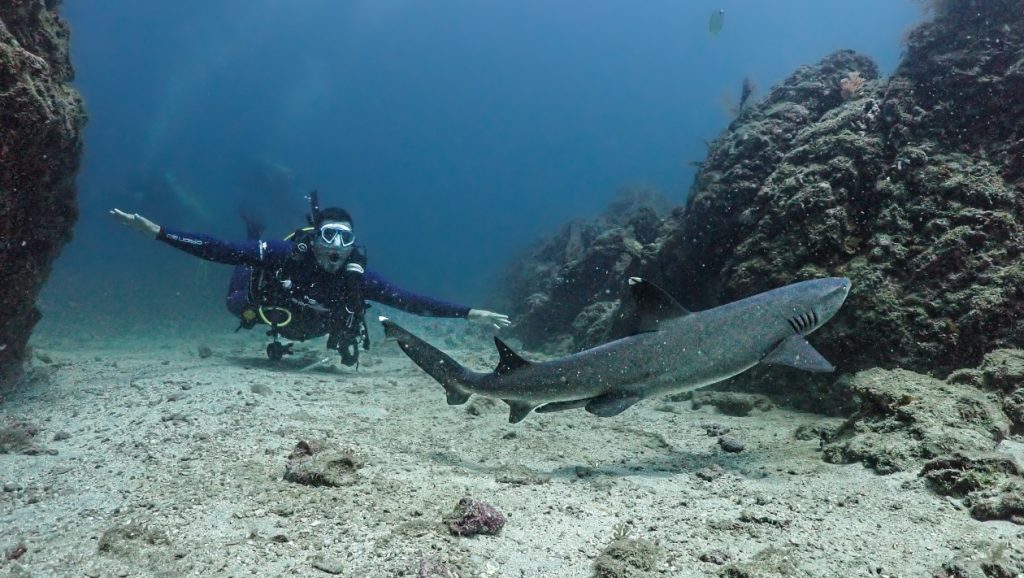
Scuba diving in Costa Rica, Best places
The best diving spots in Costa Rica are located typically in the Pacific side. However, you may find some good spots for scuba diving in the South Caribbean.
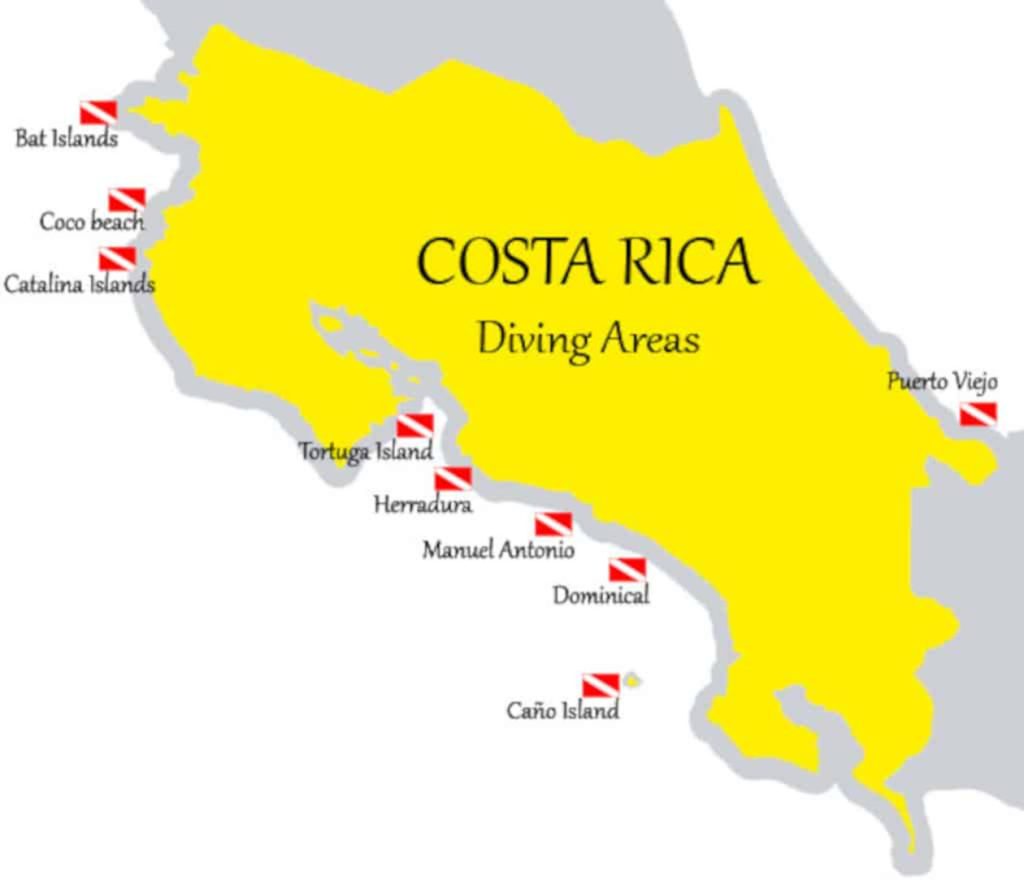
In general, the islands offer a greater diving experience compared to the shores.
This is mainly due to two reasons:
- Costa Rica is a country with a long rainy season and big rivers. During the months of September and October the rain is usually very intense. Large rivers carry a lot of sediment towards the coasts causing a decrease in visibility. Obviously, the best diving in Costa Rica is not found near the mouths of the great rivers.
- The swell in Costa Rica is very consistent. For this reason, the country is a great surf destination. The waves produce a lot of sedimentation, especially near the shore, reducing visibility.
For the above reasons, best diving spots in Costa Rica are far from the coastal areas, that is, on the islands.
Common marine life sightings for Costa Rica
The following table shows a list of some of Costa Rica’s marine species and when is the best time to see them.
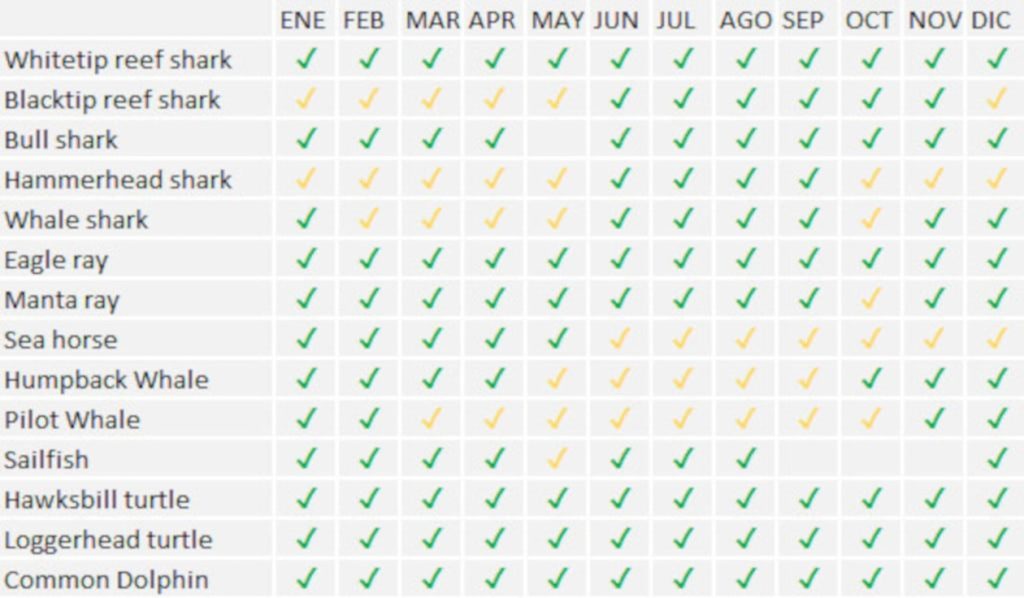
Best places for diving on the Pacific Coast.
Costa Rica is a privileged country as it has access to two oceans. In the West the Pacific Ocean and in the East the Atlantic Ocean, with 15.69% of its marine territory under conservation.
Both oceans are separated by a 322 km strip of land. This means that Costa Rica, despite being a small country, has a great marine biological diversity.
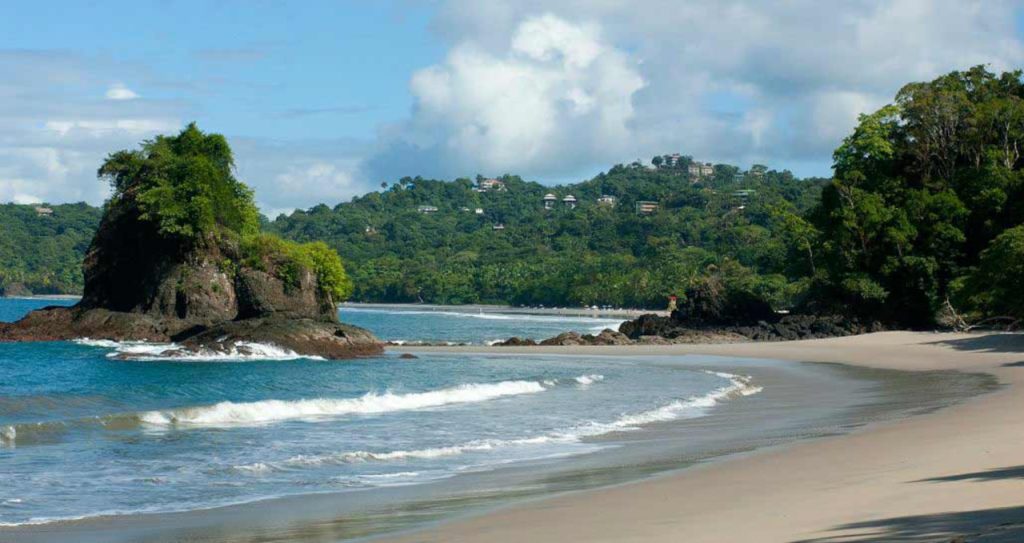
The Pacific Coast stretches from Guanacaste, on the Nicoya Peninsula, to Punta Burica in the South. It has a total extension of 1016 kilometers made up of beautiful beaches and bays.
The best places for diving in Costa Rica are in the northern and southern part of the Pacific side.
Starting from Guanacaste, we will share with you the best places for scuba diving in Costa Rica.
In this article, we also mention some that may not represent the best option available.
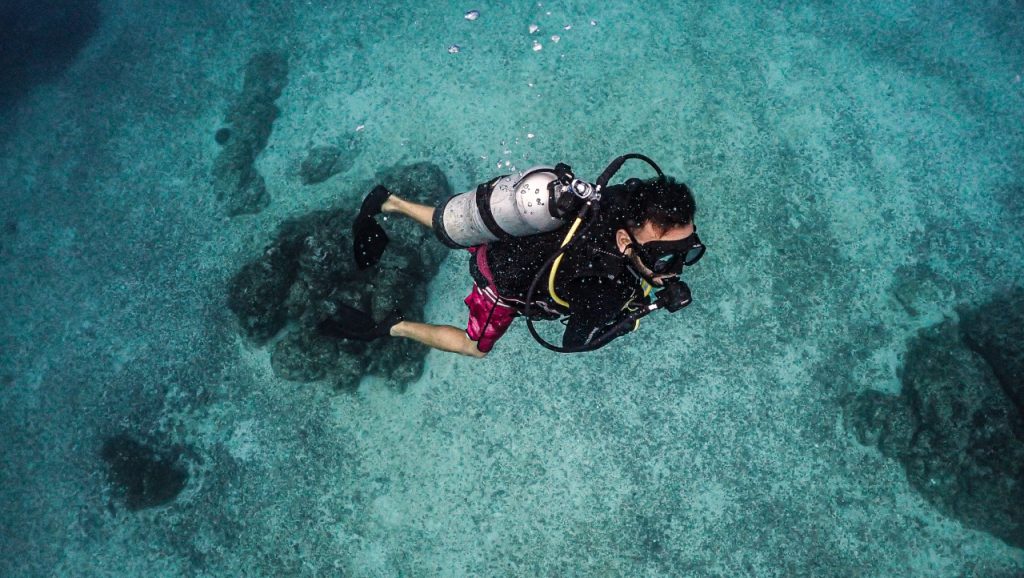
Scuba diving in Guanacaste, North Pacífic
The province of Guanacaste is located in the northwest of the country. It is well known for its beautiful beaches, plains and mountains with some active volcanoes.
The central city of Guanacaste is Liberia, which is located 34 kilometers (40 minutes) from Playa del Coco and 210 kilometers from the capital San José.
Guanacaste’s climate is tropical dry, with a warm temperature most of the year that varies between 25 ° C and 35 ° C.
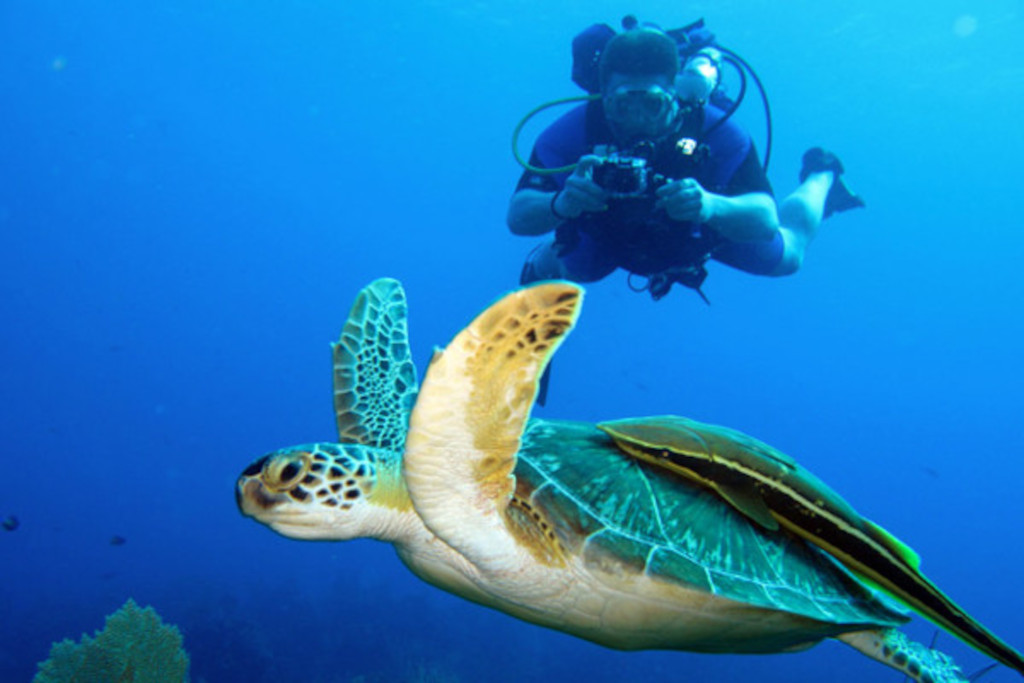
Scuba diving in Guanacaste is a great experience, mainly on the islands that are a bit far from the coastal areas.
In Guanacaste, you can find several PADI dive centers that offer tours to the main points. Some of the beaches also offer good diving spots whose visibility may vary throughout the year.
Below we will tell you about the best diving spots in Guanacaste and some, which may not be the best, but which can offer you an acceptable experience.
Bat Islands Scuba Diving
The Bat Islands are located 30 miles from Coco Beach, in Guanacaste. They are protected and belong to the Santa Rosa National Park.
To travel to the Bat islands (Islas Murciélago in Spanish) it is necessary to join a Tour.
The boat ride takes about 1 hour, depending on ocean conditions. During the trip to the Bat Islands it is sometimes possible to observe dolphins and turtles.
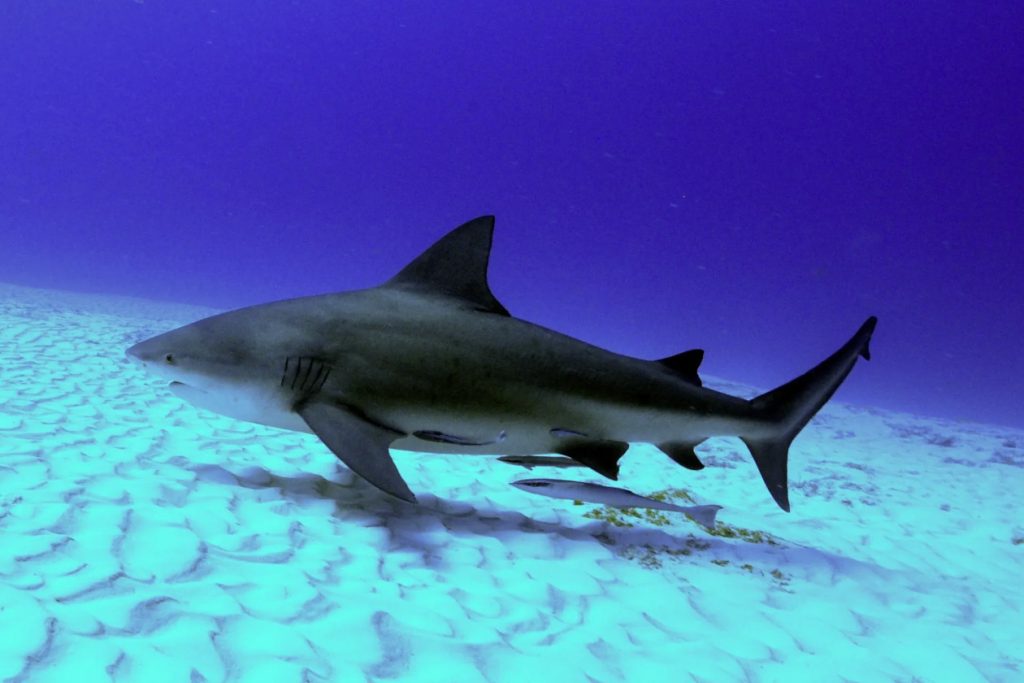
The Bat islands offer a wide diversity of marine life. Ocean currents carry a large amount of nutrients. These nutrients attract many marine species and make possible the existence of beautiful corals and rock formations full of life.
In the bat islands, between the months of August and Ocotober, it is very common to find the bull shark. These animals can grow up to 12 feet in length.
During a Bat Islands scuba diving tour, it is also possible to observe stingrays, schools of eagle rays, barracudas, thick schools of grunts, snappers and many other species.
Turtles are usually seen quite frequently.
To dive in the Bat Islands, it is important that you have a certain level of experience. This mainly because of the strong currents and the occasional swell, which you could experience during a dive.
Diving Conditions at Bat Islands, Costa Rica
Here you have a summary of the main conditions in the Bat islands.
| DISTANCE FROM THE SHORE | 30 miles from Playas del Coco |
| VISIBILITY | From 20 to 90 feet |
| MAX DEPTH | From 60 to 130 feet |
| TEMPERATURE | Between 75 and 80ºF |
| CURRENTS | Common presence of strong currents and waves. |
| BOTTOM TYPE | Rock Bottom |
| COMMON SPECIES | Bull shark, giant manta ray, eagle rays, barracudas, grunts, snappers, puffer fishes, angel fish, butterfly fish, goliath grouper, moray eels, octopuses, sea turtles, sail fish, wahoo and mahí mahí. |
| BEST SEASON | From March to November |
Catalina Islands Scuba Diving
The Catalinas Islands is one of the best diving destinations in Costa Rica. They are a chain of rock formations of volcanic origin, which are located about 8 miles from the coast. The rock formations of the Catalinas Islands rise between 18m and 36m from the sandy seabed.
The amount of marine life that you can see in the Catalinas Islands is impressive, which is why it is considered one of the most recommended diving spots, along with Isla del Caño.
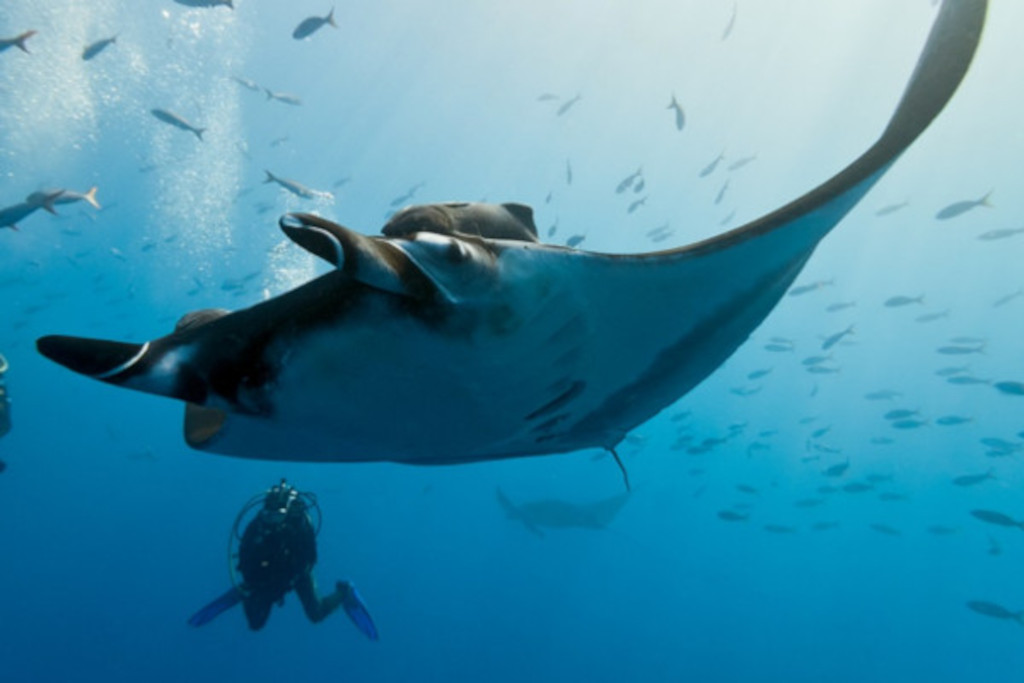
During a diving tour in the Catalina Islands it is common to meet the Giant Pacific Manta Ray. This beautiful animal usually visits the islands between the months of December and May, during the dry season.
Manta ray
The giant Manta Ray can measure up to 7.3 meters in wingspan and weigh approximately 1,300 kilos. These huge animals feed mainly on microscopic plants and plankton which is very abundant on the islands.
The Catalina Islands are also home to the eagle ray, the devil stingray, and the cow-nosed ray. It is also possible to observe turtles, dolphins, moray eels, puffer fish and grumpy fish.
Dive Sites in Catalina Island
The dive sites at Las Catalinas are suitable for all levels of diving and snorkeling. Some spots require more experience, due to the currents and the depth. In these cases we recommend a PADI open water advanced certification.
In total there are about 30 dive sites on the Catalinas Islands, although 6 are explored more regularly. The most popular sites are Roca Elefante and Los Sombreros.
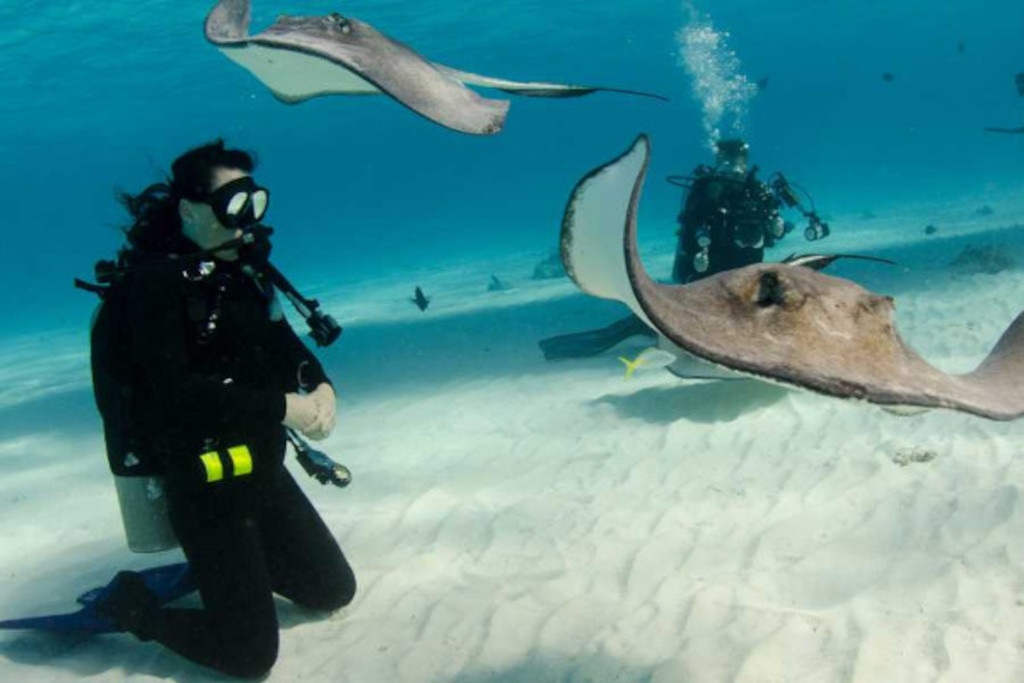
How to get to Catalina Island?
To get to Catalinas Islands you must join a Diving Tour. Tours are offered by various dive operators in the area and the starting points are usually Tamarindo Beach and Playas del Coco.
Dive trips to the Catalina Islands last approximately 1 to 2 hours, depending on the starting point. The operators usually offer 2-tank dives, so the experience in the islands will take you a whole day.
Some operators also offer private trips to the islands, for those who want to enjoy more privacy. However, we always recommend that you contact an experienced local dive operator especially if you are from abroad.
If you are looking for a good Scuba Diving in Costa Rica, Catalina Islands may be one of the best options.
Diving Conditions at Catalina Islands
Here you have a summary of the main conditions in Catalina Islands.
| DISTANCE FROM THE SHORE | 20 miles from Playas del Coco |
| VISIBILITY | From 20 to 90 feet |
| MAX DEPTH | From 40 to 120 feet |
| TEMPERATURE | Between 75 and 85ºF |
| CURRENTS | Common presence of strong currents and waves. |
| BOTTOM TYPE | Rock Bottom |
| COMMON SPECIES | giant manta ray, devil manta rays, eagle rays, barracudas, grunts, snappers, puffer fishes, angel fish, butterfly fish, goliath grouper, moray eels, octopuses, white-tipped reef sharks, angel fish, sea turtles |
| BEST SEASON | From July to November (September to November is the ebst visibility) |
Scuba Diving in Tamarindo
Tamarindo is one of the most popular beach destinations in Costa Rica, located in Santa Cruz, Guanacaste. Many years ago, Tamarindo was a fishing town. Today the tourism industry is its main source of income.
In Tamarindo you can do many things: Surfing, ATV tours, hiking, canopy, diving, snorkeling, zip-lining, horseback riding, kayak and much more. Its beautiful beaches are the main attraction of the thousands of tourists who visit Costa Rica every year.
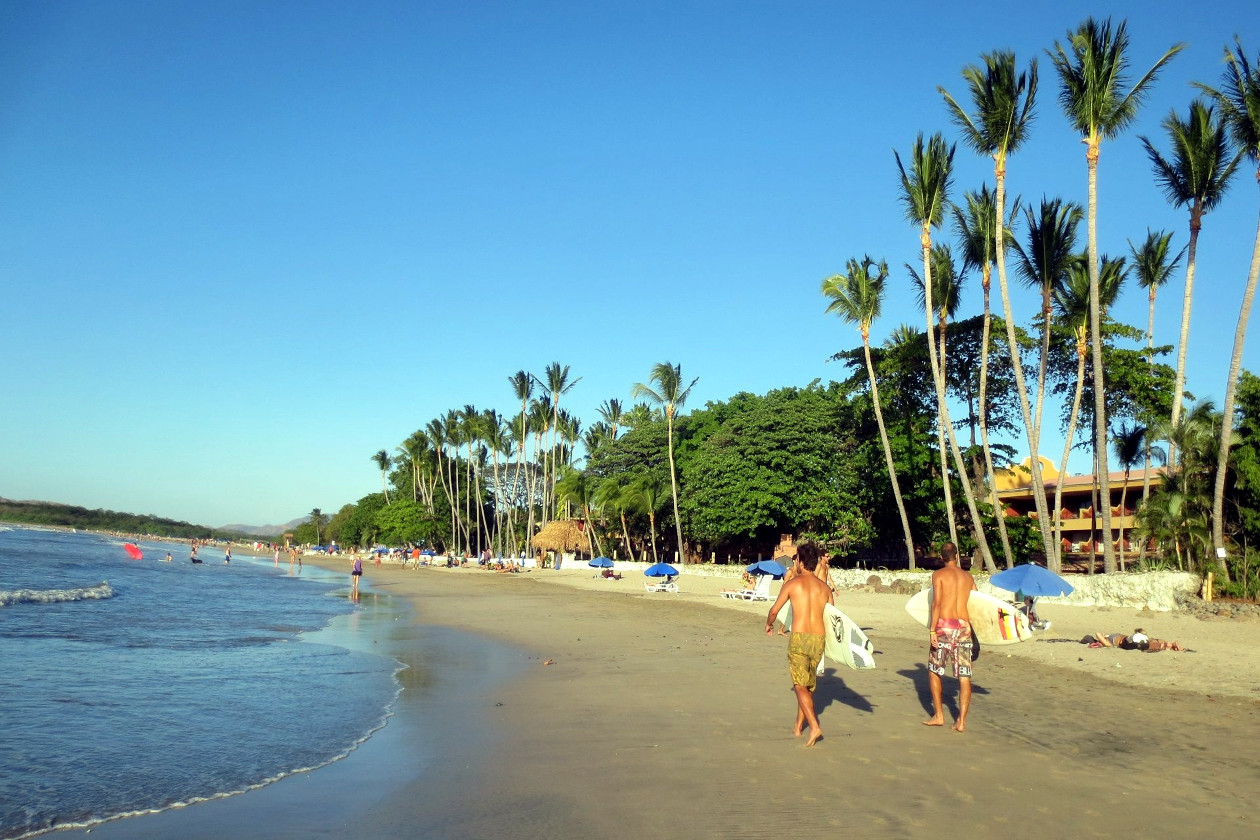
In Tamarindo you can find several PADI dive centers that offer dive tours in the area.
It is important that you know that Tamarindo is not actually a good place for diving. Most of the Tours depart from Tamarindo to some points located at a certain distance where the conditions for diving are adequate.
One of the Tours that dive centers in Tamarindo usually offer is the Catalina Islands Diving Tour. We will tell you more about this destination later.
Scuba Diving Playas del Coco
Playas del Coco is a beautiful set of beaches located in the Gulf of Papagayo, in the North Pacific.
The tranquility of its waters makes this one of the areas near the coast with a fairly good visibility for scuba diving.
Around Cocos beaches you can find about 20 diving spots. Punta Argentina, Tortuga, La Cruz are some of the most visited.
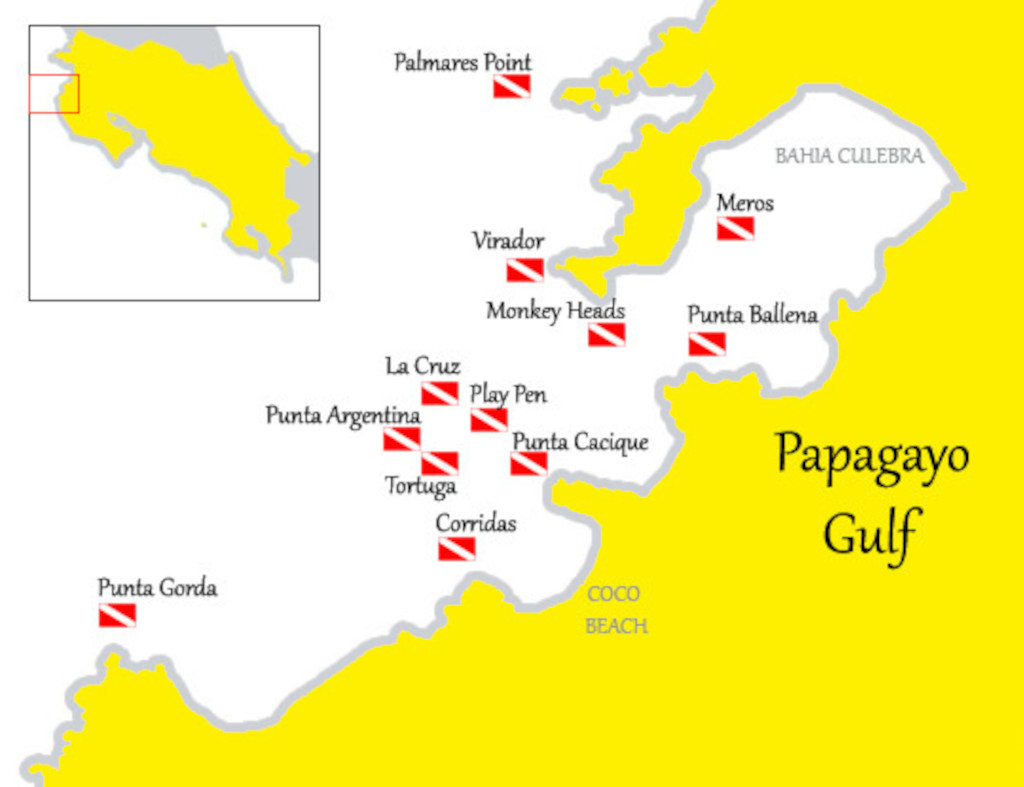
Most of the points are located about 10-20 minutes by boat and are easily reachable by small boats due to the calm waters.
Due to the nutrient-rich waters it is common to find a wide variety of marine life. Some animals like whiptail stingrays, whitetip reef sharks, large schools of grunts, and snappers make this beaches their home.
The different spots offer various marine environments such as volcanic rocks, rocky pinnacles, long rows of rocks and rocky walls, all full of life.
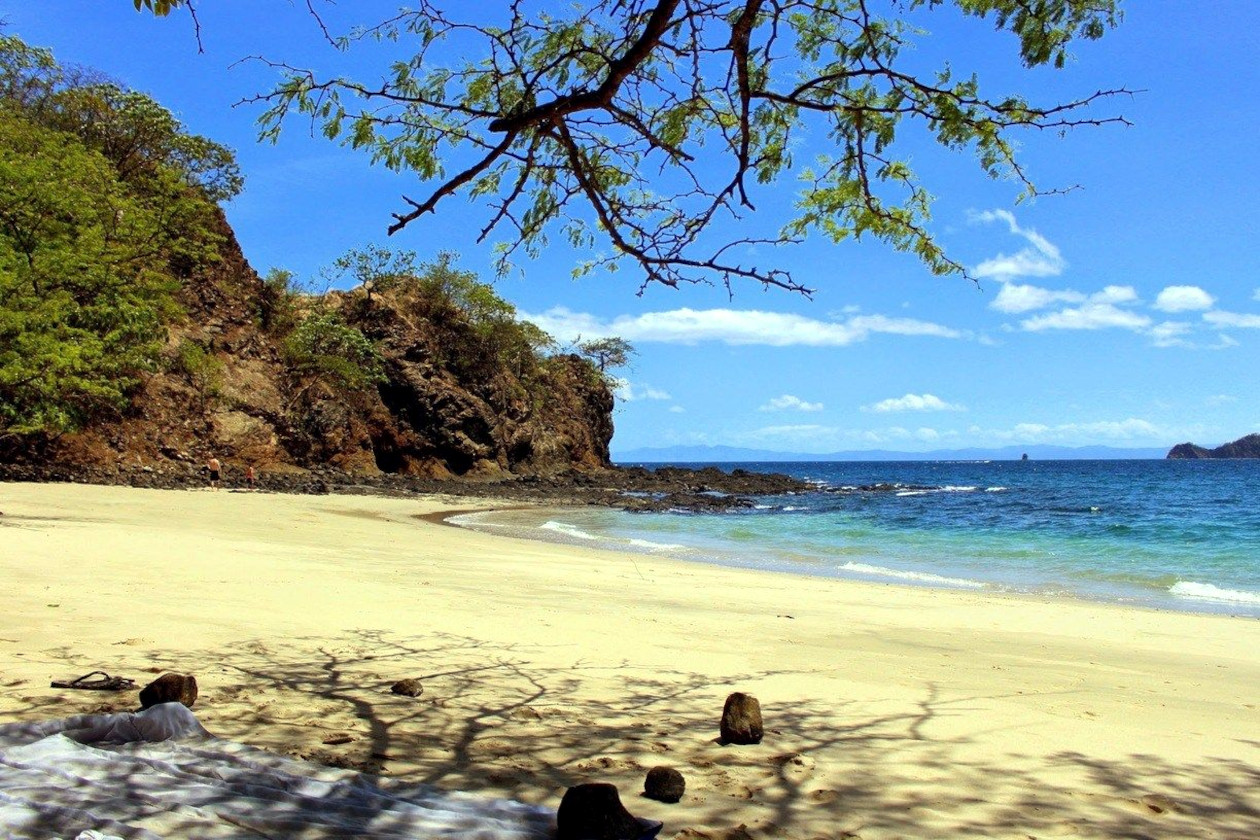
The diving conditions are generally good throughout the year offering good visibility and the maximum depth at some points is 100 feet.
Scuba Diving in Playa Hermosa
His name says it all. Playa Hermosa (Beautiful beach in Spanish) is a quiet, white-sand beach, nestled between two mountains, ideal to get away from the crowds and relax. It is located in the Gulf of Papagayo, next to the Coco beaches.
The beach is perceived by travelers as a quiet and comfortable place where you can see wonderful sunsets.
If you love nature, near Playa Hermosa you can find three national parks: Rincon de la Vieja National Park, Palo Verde National Park and Santa Rosa National Park. All these parks are intended to protect wildlife.
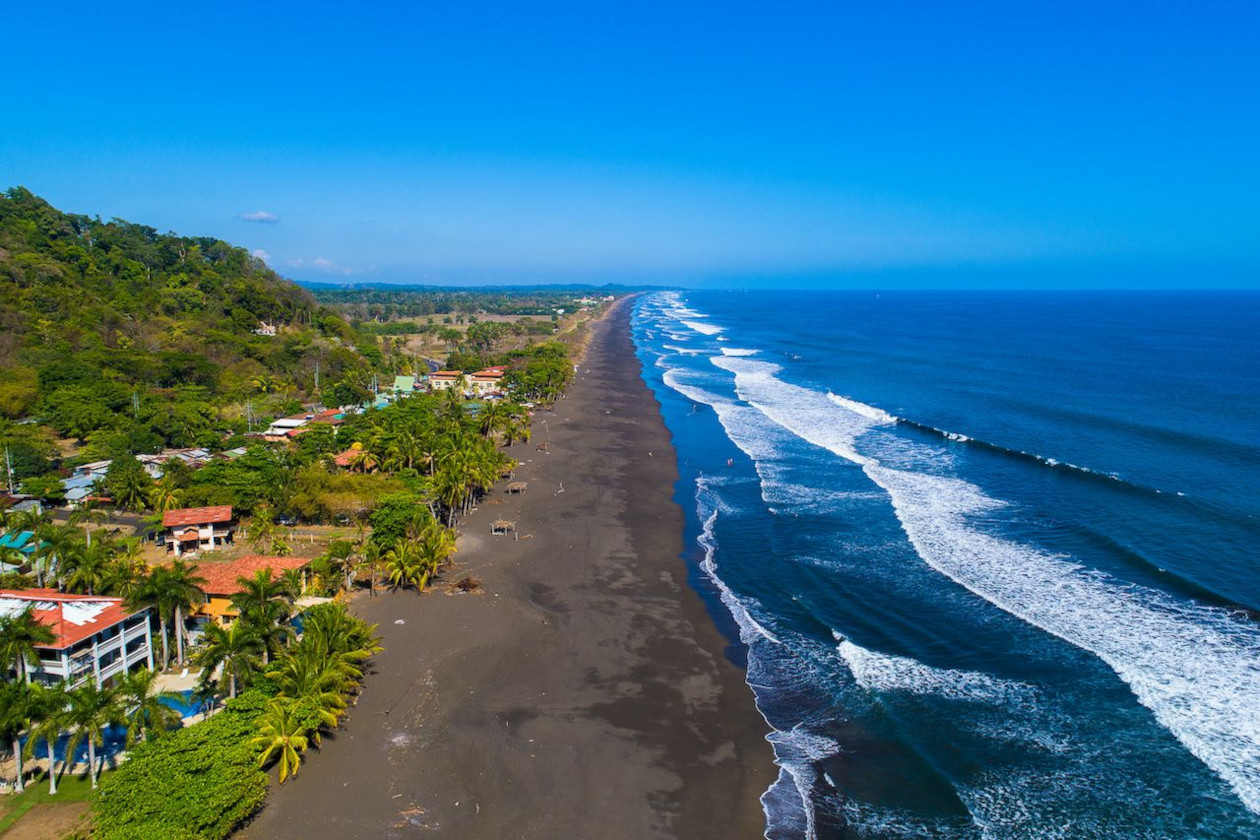
Diving in Playa Hermosa is a good experience, as it shares some of the points with Playas del Coco. Most of the dive sites are in the Gulf of Papagayo and Culebra Bay.
Some of the main scuba diving spots near Playa Hermosa are:
- Punta Cacique
- Play Pen
- La Cruz
- Monkey Heads
- Punta Ballena
- Meros (Culebra Bay)
Like Playa del Coco, Playa Hermosa is a good access point for other higher-level diving experiences. Many dive operators offer Tours to the Catalina Islands and the Murcielago Islands.
Scuba Diving in Central Pacific
The Central Pacific includes the northern part of the province of Puntarenas until Quepos. It is a transition zone between the climates of the dry tropical forest to the humid tropical forest. Their temperatures range between 20 and 34 degrees Celsius.
Scuba diving in the central Pacific area is not very popular. This is possibly since it is an area of narrow plains with short rivers of great flow, which tend to carry a lot of sediment.
Herradura Scuba Diving
Playa Herradura is a very popular tourist destination. It is located 1 hour from the International Airport and is very accessible for tourists.
Its black sand beaches are very frequented by tourists. Many of them locals looking to enjoy the sea and surf.
In the area there are many things you can do. Canopy tours and hiking in nearby National Parks are some of the options.
Herradura Beach has a luxury hotel and the “Marina Los Sueños”. This is a port for the development of world class sport fishing, approved by the Costa Rican government.
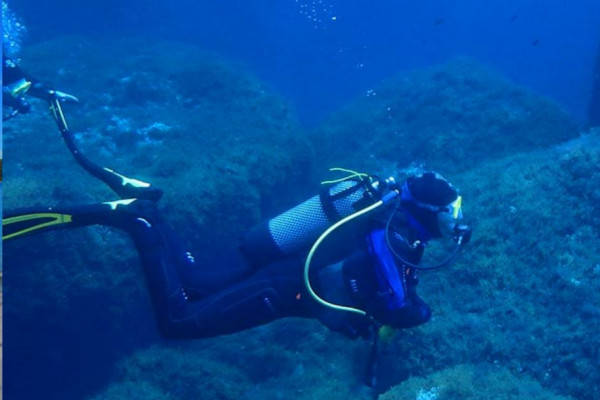
Scuba Diving in Herradura is maybe good for beginners and for those taking certification courses. However, visibility in this area is often limited and marine life is not as abundant as elsewhere.
During a scuba diving tour in Herradura it is possible to see colorful fish, lobsters, moray eels and sometimes some small octopuses.
However, if you are looking to have a good diving experience, we do not recommend Herradura as your destination. Read on and discover other places near Herradura Beach that are more suitable and where you can see much more.
Scuba Diving in Jaco
Jacó is a very popular beach town located two hours from the capital San José. It is characterized by being an energetic city with a party atmosphere and many hotels to enjoy.
Playa Jacó is not the ideal destination to relax and enjoy tranquility. It is ideal for those who enjoy people, partying and night activities. If you are looking for activity, adrenaline, beach and party, Jacó is ideal for you.
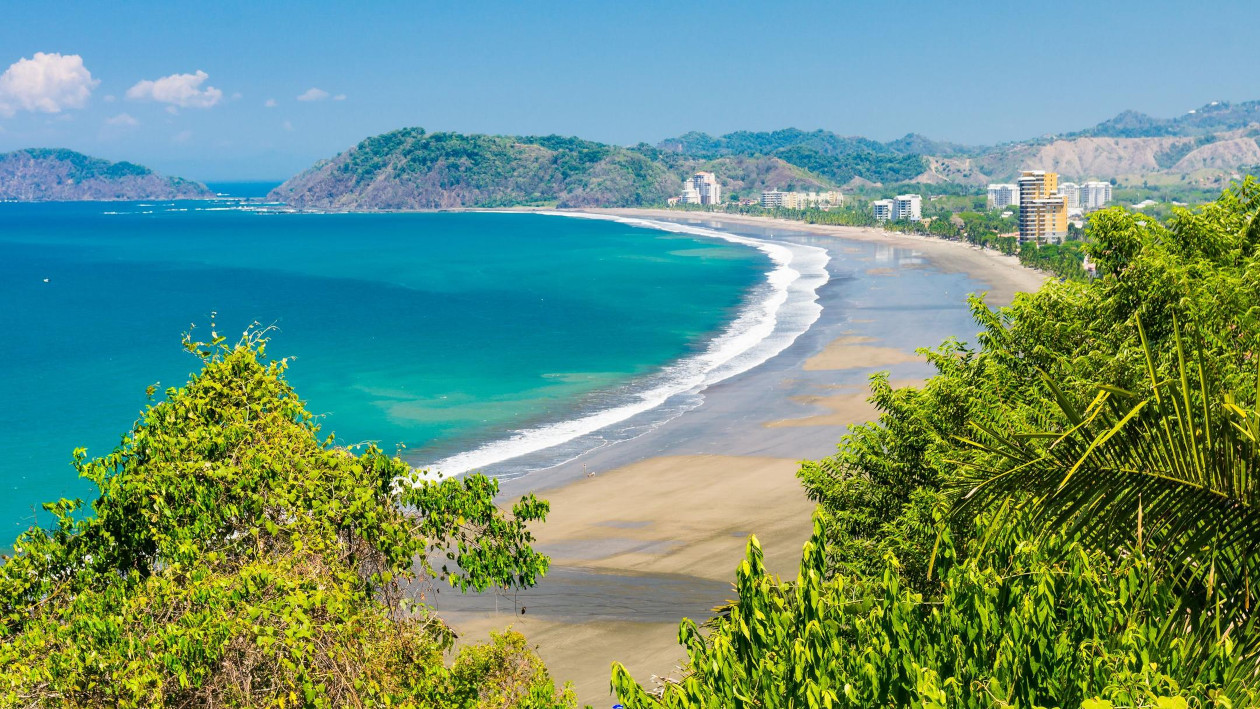
In the area you can find many activities to do: Fishing, surfing, hiking, canopy, rafting and horseback riding are just some of the options. There are many tourist companies and hotels that offer multiple activities for everyone to enjoy.
Unfortunately, when it comes to scuba diving, Jacó doesn’t have much to offer. The waters do not have enough visibility and the marine life that you can see is limited.
It is possible to find scuba diving near Jacó, but it is necessary to travel a little further south. At about 60km you will find Quepos, where the Manuel Antonio National Park offers some attractive options. And even better, 120K to the south is the Marino Ballena National Park, in Uvita.
Scuba Diving in South Pacific, Costa Rica
The South Pacific stretches from Quepos to Punta Burica in southern Costa Rica. It is an area with a tropical rainy climate and one of the only places in Costa Rica where the mountains are so close to the sea.
In this area you can also find the Corcovado National Park. This protected area is considered the place with the greatest biological biodiversity on the entire planet. Definitely a place worth visiting!
Traveling to the South Pacific is a very good option if you are looking for good Scuba Diving experiences. The Ballena Marine Park, Caño Island and Drake Bay are perhaps the best places, although the island is the best.
Scuba diving in Uvita, Marino Ballena
The scuba diving tour to the Marino Ballena National Park is a great option. This Park protects the largest coral reef in Central America, with more than 80 marine species living in its waters.
The Marino Ballena National Park is located in Uvita, about 220 kilometers from the city of San José. The route 34 is used to get there and it takes about 3 hours to travel from The Capital.
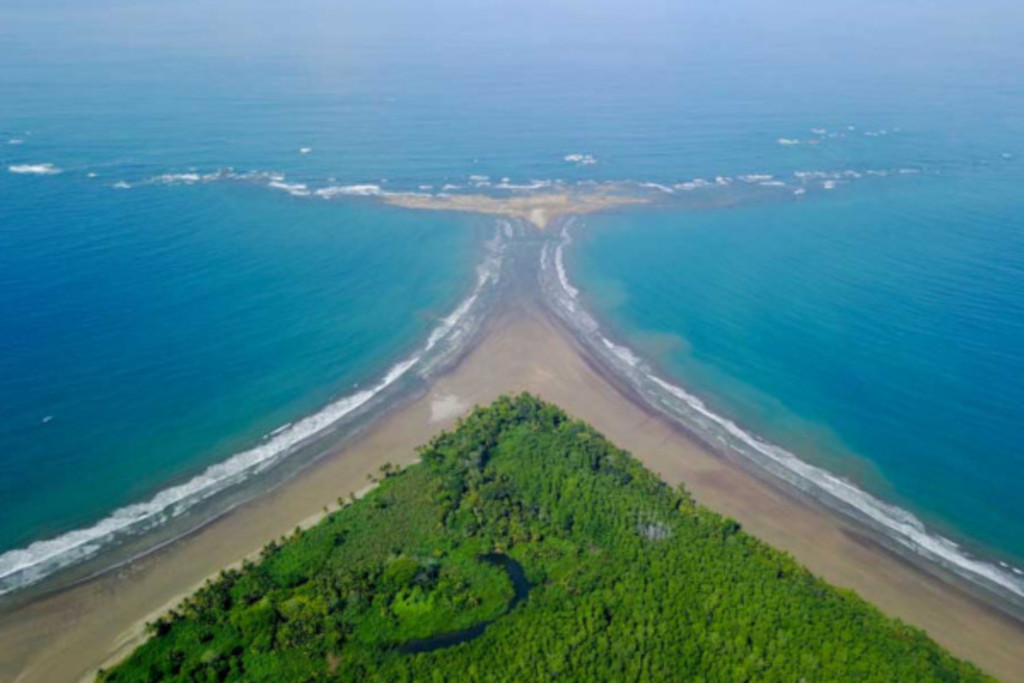
During a Diving Tour in the Marino Ballena Park it is possible to find a large amount of marine life. Goldfish, moray eels and all kinds of mollusks and arthropods are hidden within the coral reefs.
Beautiful reef walls, rocky pinnacles, islets and seamounts make up this ecosystem so full of life.
Between August and October, if you are lucky and the visibility is good enough, it is possible to see some humpback whales and other cetaceans.
The best date for the Diving Tour in the Ballena Marine Park is December to May, in the dry season. During the rest of the year visibility is usually much lower due to rainfall and sedimentation.
The Park has an impressive marine ecosystem. However, if you are planning to travel to Costa Rica between the months of April to November, we recommend you visit Caño Island instead of the Marine Park. The park might not be the best diving experience for you during this time.
Scuba diving at Caño Island
Caño Island is probably the best diving destination in Costa Rica, second only to Cocos island.
In fact, due to its beauty and its invaluable ecosystem, Caño Island is considered by many divers as “The Cocos Island in miniature”.
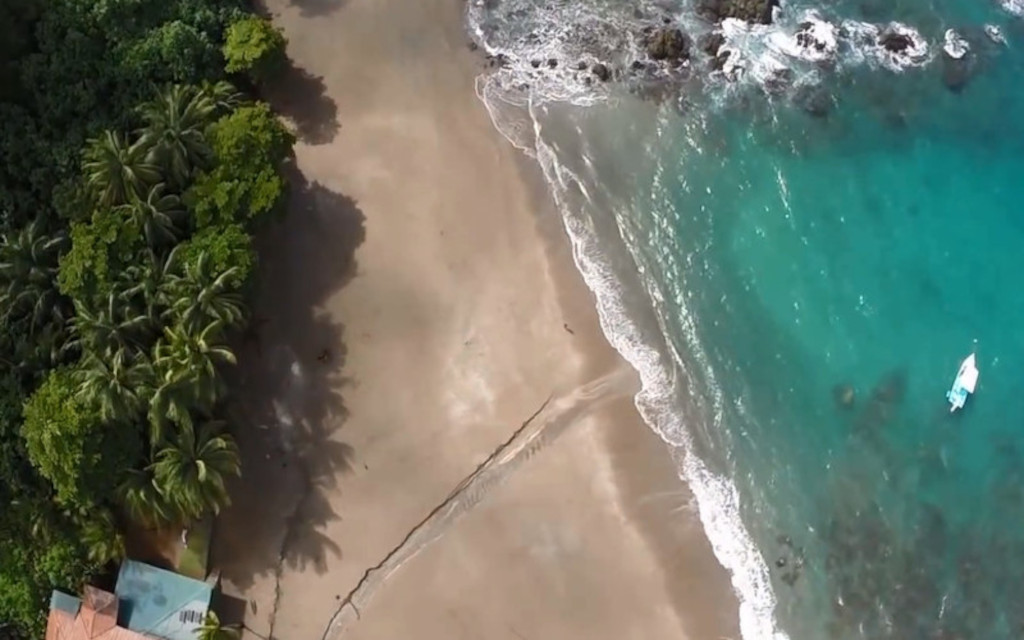
The Isla del Caño Biological Reserve was founded in 1978. It protects 324 hectares of forest and more than 5,660 hectares underwater. The island is home to more than 70 native marine species.
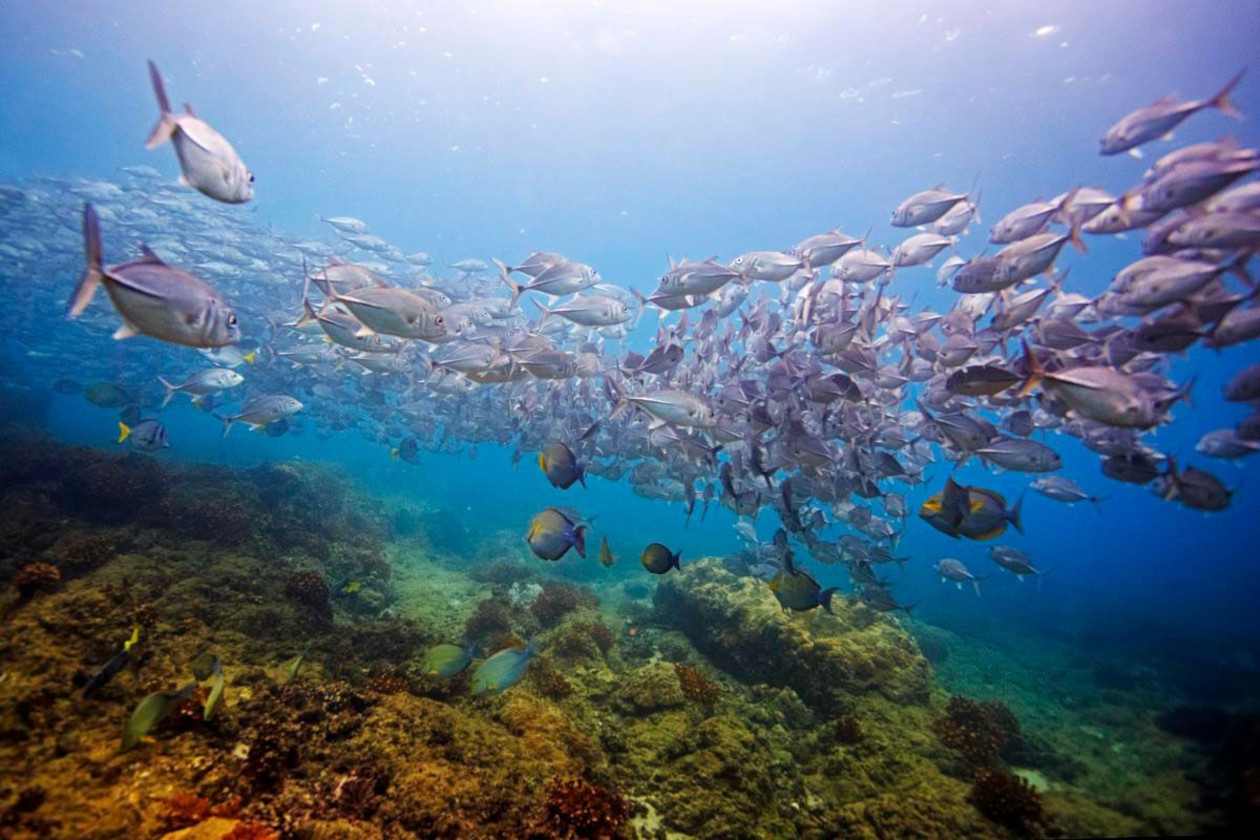
Something unique and interesting about Caño Island is that due to the system of marine currents of the Pacific Ocean, it is the place of passage for many migratory creatures. Turtles, stingrays, and humpback whales can sometimes be seen during their season.
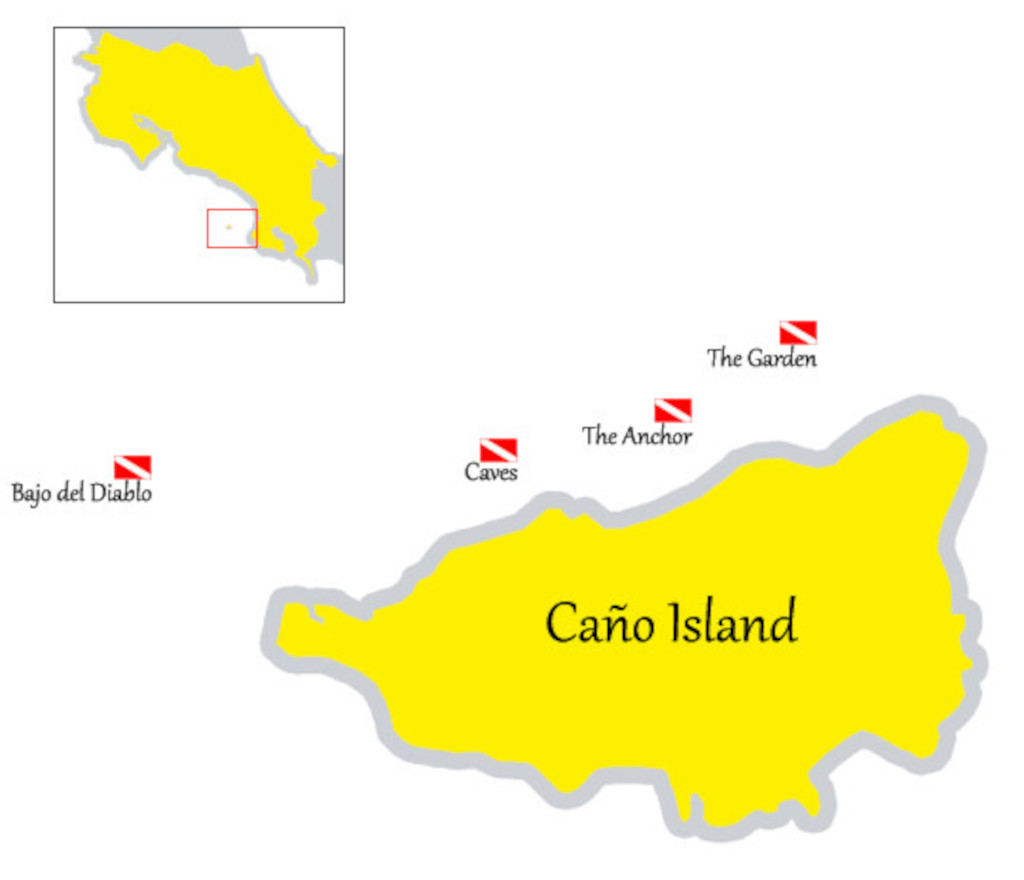
Some of the best diving spots on Caño island are:
- Shark Cave, where you can observe a cave with white tip reef sharks.
- Devil’s Pinnacle, rock formations up to 45m deep where the giant manta ray and many other species are often seen.
- The Shipwreck, where you can see the scorpion fish and many other fascinating animals. The name of this place has nothing to do with any shipwreck.
- The Garden, well known for its beautiful coral reefs, full of life. Here you will find large schools of fish and you can often see turtles and whitetip sharks.
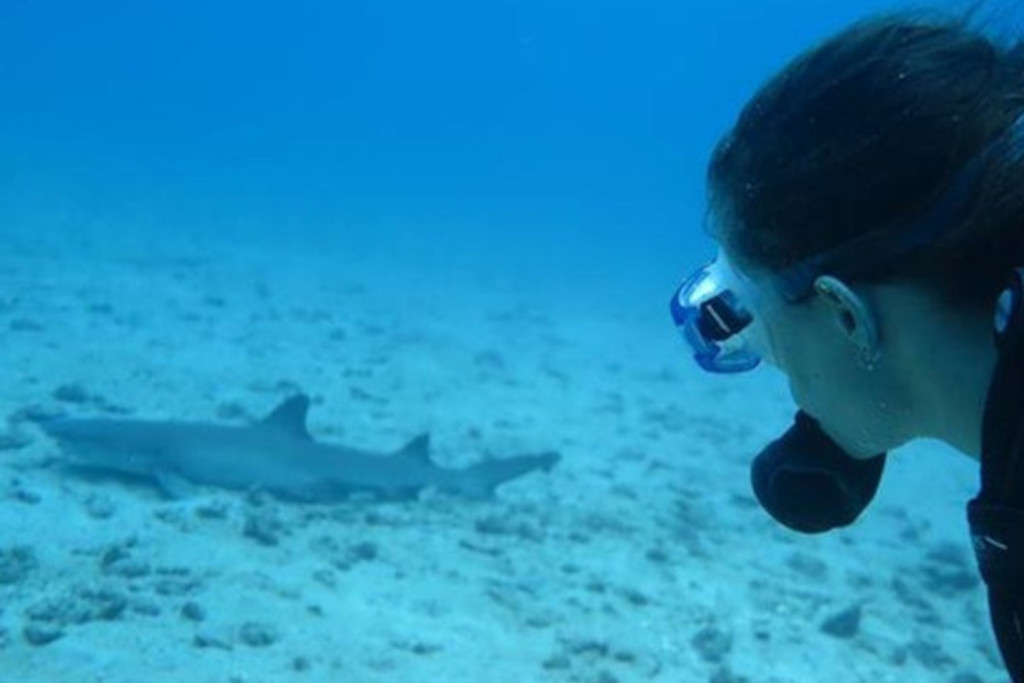
Caño Island Scuba Diving Conditions
Here you have a summary of the main conditions for Scuba Divint in Caño Island:
| DISTANCE FROM THE SHORE | 70 minutes from the coast of Uvita |
| VISIBILITY | From 10 to 90 feet |
| MAX DEPTH | From 30 to 80 feet |
| TEMPERATURE | From 70ºF to 80ºF |
| CURRENTS | Presence of moderate currents and small waves. Strong currents at Bajo del Diablo |
| BOTTOM TYPE | Rock formations and sand bottoms. |
| COMMON SPECIES | White tip reef sharks, jacks, Eagle rays, snappers, puffer fishes, angel fish, butterfly fish, moray eels, octopuses, sea turtles, lobsters. Sometimes it is possible to see humpack whales (August to October) |
| BEST SEASON | December to May . |
Traveling to Caño Island
To get to Caño Island, logically, you need to hire a boat or a Tour. It is important that the captain has the necessary experience to make the trip in the open sea.
There are several ways to get to Caño Island.
The first and easiest way is to hire a Tour from Uvita. The island is located 3 km from the Marino Ballena National Park in Uvita.
This is the most recommended option, since it is the most direct. If you come from San José, it will take you 3 hours to get to Uvita and about 45 minutes to the island.
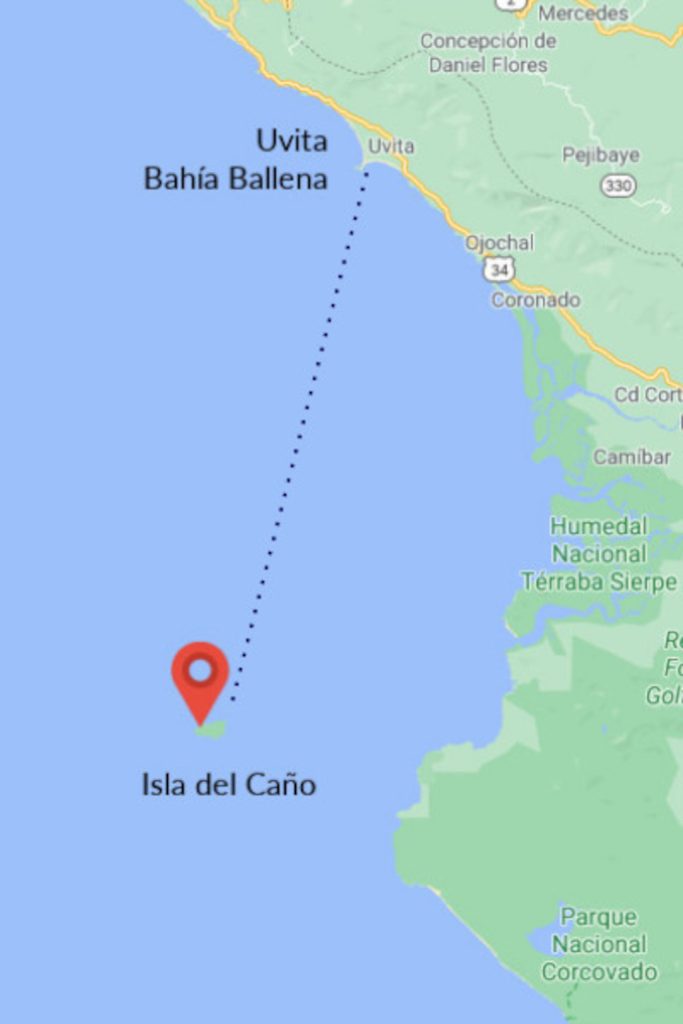
The second way is to hire a boat or Tour from Sierpe or Drake Bay in the south of the country. The problem with this option is that it will take you more time to drive to the south of the country, although the trip to the island is a little shorter in distance.
Scuba diving at Drake Bay
This bay takes its name from Sir Francis Drake, a 16th century explorer considered a pirate by the Spanish. It is thought that he established a port in the bay for his constant travels. Drake, as he is commonly known, is also believed to be the place where one of his treasures is still hidden.
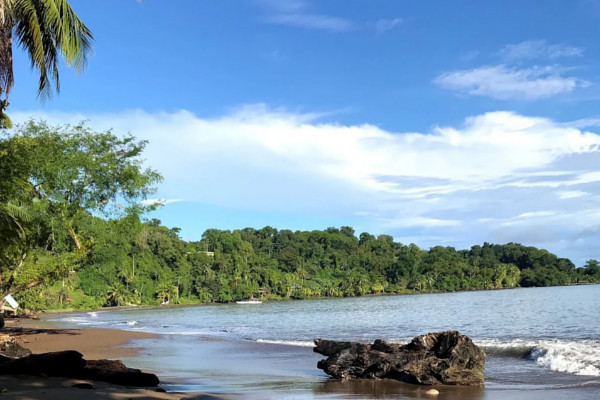
Although Drake Bay is normally promoted as a diving destination, it is important that you know that there are actually no good spots in the bay.
Most of the diving centers operating in the area take their groups to Caño Island.
The island is located about 40Km outside the bay and tours usually depart from the beach.
It is important to consider that if you are on vacation in the southern area, visiting Caño Island from Drake Bay is a very good option. However, if you come from the north or are vacationing in a central area, it is much better to hire the Tour from Uvita.
Scuba Diving at Cocos Island, Costa Rica
Cocos Island is considered one of the most incredible diving destinations on earth and one of the most beautiful National Parks in Costa Rica.
In 1997 the UN declared the Cocos island Natural Heritage of Humanity and just a year later it was declared a wetland of international importance.
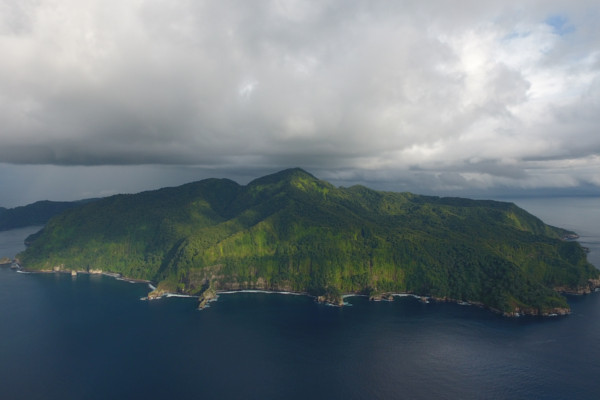
To get to “Isla del Coco” it is necessary to take a boat, which normally leaves from Puntarenas. There are also some private tours that you can hire and that leave two or three times a month to the island.
Getting to Cocos Island National Park can be a tedious journey, due to the swell, strong currents and winds. It takes approximately 36 hours to arrive and 32 hours to return. It is advisable to take pills for sea sick and be very patient.
But the reward of reaching the island is unmatched. If you ever saw the movie Jurassic Park, you will understand why Sorna Island took its inspiration from Cocos Island.
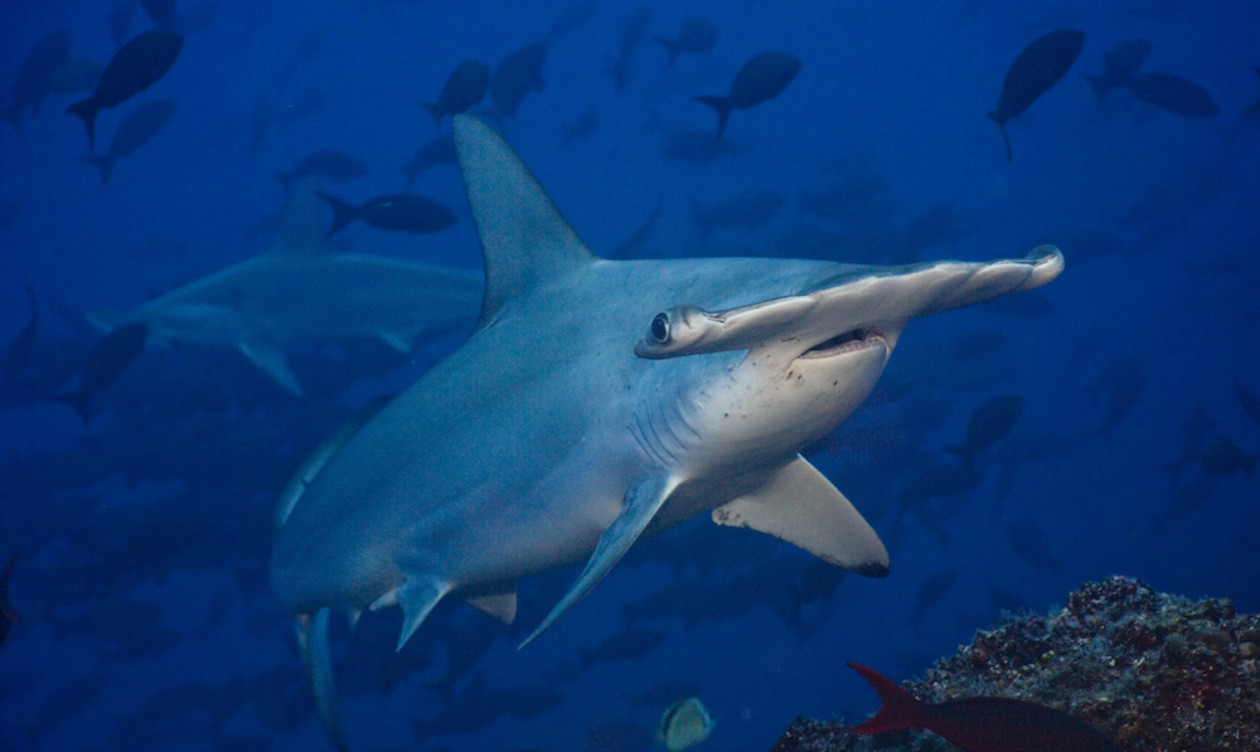
Cocos Island is one of the best places to dive with large animals and predators. The hammerhead shark is one of its inhabitants.
There are some species that are unique to the island and the amount of fish is impressive. Some of the creatures that you can see on Cocos Island are:
- Red-lipped batfish
- White tip sharks
- Tiger sharks
- Giant hammerhead sharks.
- Berkley Turtles
When is the best time to dive on Cocos Island?
Scuba diving in Cocos Island is good all year round, although there are two different seasons: the dry season and the rainy season.
The dry season, from December to April, where the sea is more relaxed but the amount of life you can see is a little less. The rainy season, from May to November, where the sea is a little more rough and the currents stronger, but you will be able to see larger and more numerous animals.
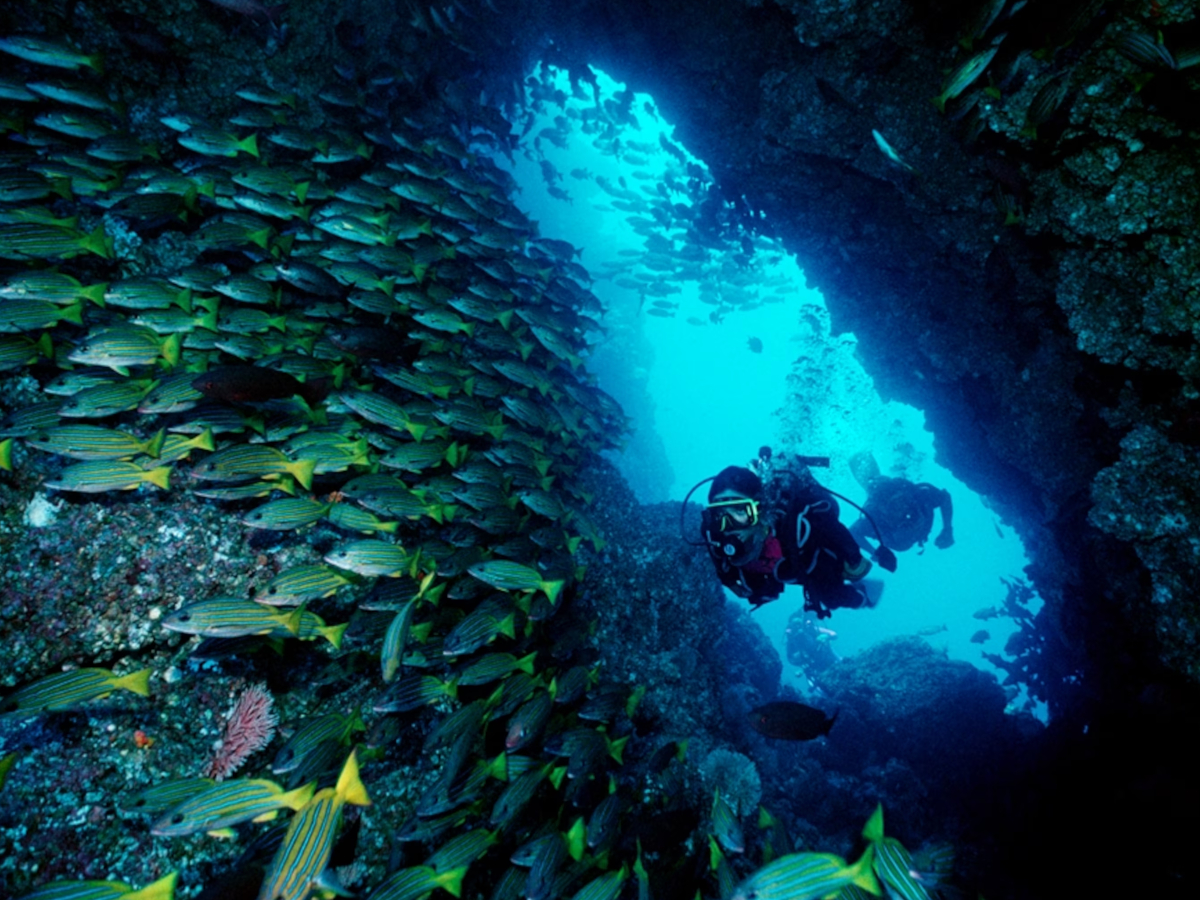
What certification do I need to dive in Cocos Island?
We recommend the PADI Advanced Open Water certification as a minimum, to be able to dive in Coco Island, since the depths range goes from 18 to 30 meters and conditions can be unpredictable, including strong currents.
Best places for diving on the Caribbean Coast.
The Caribbean coast is located in the East of Costa Rica, about 220 km from San José. Whether you travel by bus or car, it will take you approximately 3 hours to reach the best dive sites.
The geography of the Caribbean side is very different from the Pacific coast. Its 220 km stretch in a straight line, with very few bays and formations.
The best diving on the Caribbean side of Costa Rica can be found to the south. It is necessary to travel several kilometers from Puerto Limon to reach these places.
Isla Uvita, Punta Uva, Puerto Viejo, Cahuita and Punta Mona are the main for scuba diving in the Caribbean side. Marine life is also different in these waters and larger corals tend to be found than in the Pacific.
Scuba diving in Puerto Viejo
Puerto Viejo is located 60km south of Puerto Limon. It is one of the few areas in the Caribbean side of Costa Rica where you can experience a good scuba diving.
Puerto Viejo has a natural coral wall that stretches 50 miles from the coast to Panama. A large part of this coral is unexplored.
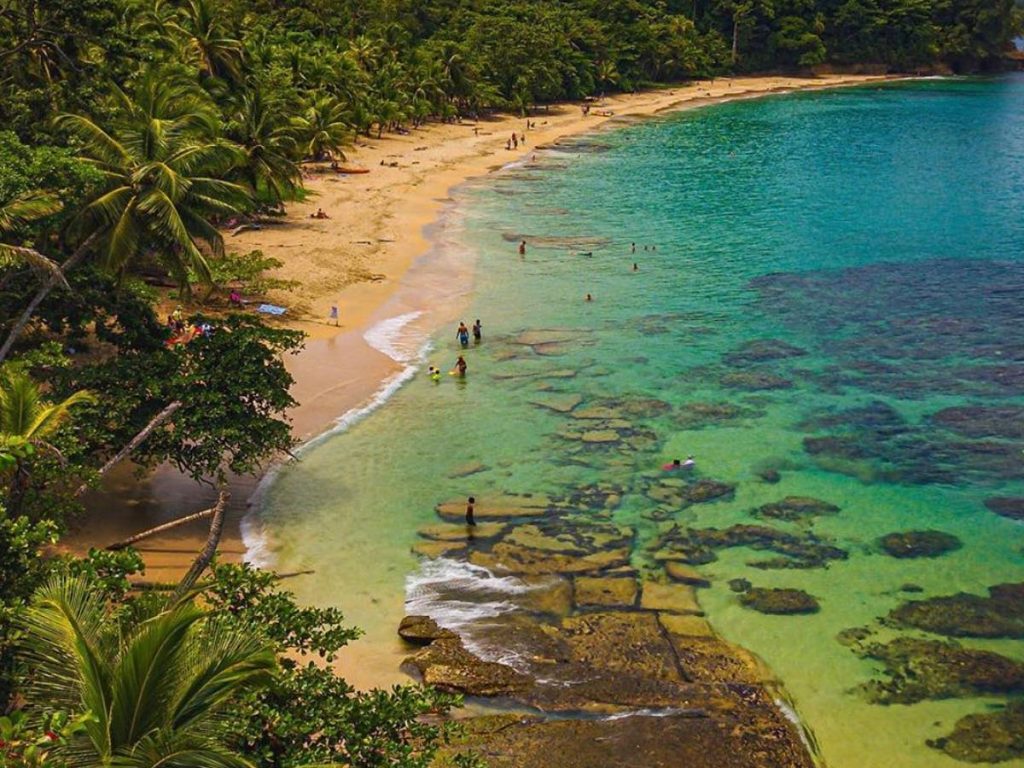
Scuba diving in Isla Uvita
Isla Uvita is another place on the Caribbean side where you can have a great diving experience. It is located 1.4 kilometers from Puerto Limón
The interesting thing about Uvita Island is that it has 2 shipwrecks. One of them is the Phoenix, a ship that sank many years ago and has become a coral reef and home to many marine species.
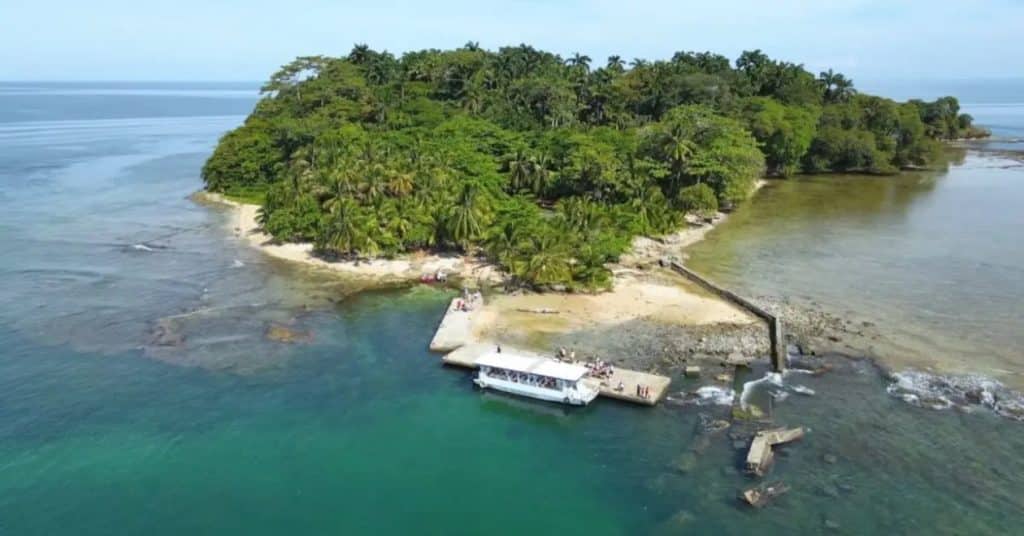
Some people believe Isla Uvita was the landing place for Christopher Columbus on his first visit to the continent.
Tropical fish, eels, urchins, and hard and soft corals are very common in the waters of the Pacific coast.
Diving in Costa Rica Prices
Diving prices may vary depending on experience and location. However, we could establish a general price range as follows:
- Places near to the beach: Less than 100 USD
- Tours to the islands: 100 USD to 200 USD
- Coco Island Tours: 2500 USD to 3500 USD
The prices of the Diving Tours normally include at least two dives, with the exception of the Diving Tour in Coco Island which is a more complete and expensive experience.
At Costa Rica Dive and Surf, we try to keep prices as low as possible without sacrificing the quality of our tours.
FAQs about Scuba Diving in Costa Rica
Scuba diving for beginners in Costa Rica
If you are a beginner in diving, Costa Rica is an excellent place to add dives and gain experience.
Most of the places we have mentioned in this article are suitable for beginners. Still, some specific points, mainly on the islands, are considered for advanced divers due to the changing currents and conditions.
Such is the case of Isla del Coco, or the Devil’s Pinacle on Isla del Caño.
The Murcielago and Catalina islands have also some not recommended spots.
Always ask your guide or instructor and always remember to respect the rules and the maximum depths allowed in your diving license.
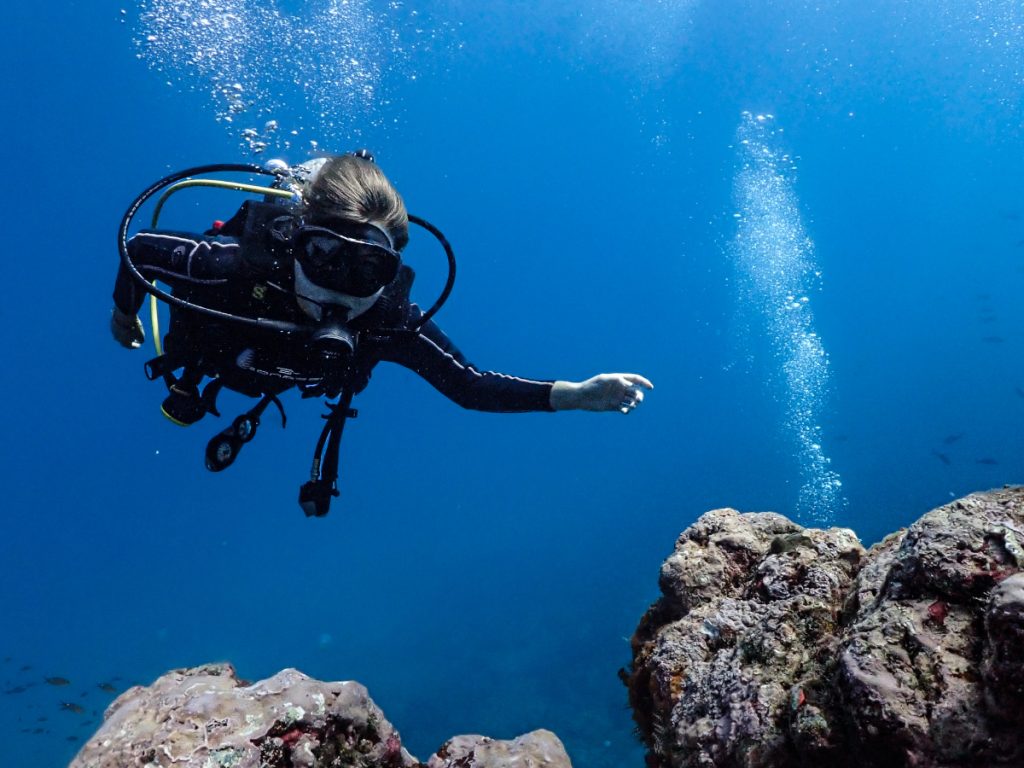
Best Scuba Diving experience in Costa Rica
Also, we have mentioned those in which you can experience the best diving and we have also mentioned some points that you should avoid, because you will not find anything interesting to see.
Until now, we have talked in detail about the best diving spots in Costa Rica.
But if you don’t have enough time and money to visit all these points, the question may arise: What is the best dive site in Costa Rica? Which one should I choose?
The truth is, there is no single best place to dive in Costa Rica.
For us, diving on Caño Island is one of the best options for three reasons:
- It is not far from the Capital (Only 3 hours)
- It is a very affordable price
- The experience is awesome, as well as the marine life that you will see.
If you are on vacation in the area you will also have many other things to do and beautiful places to visit. This makes it perhaps the best option
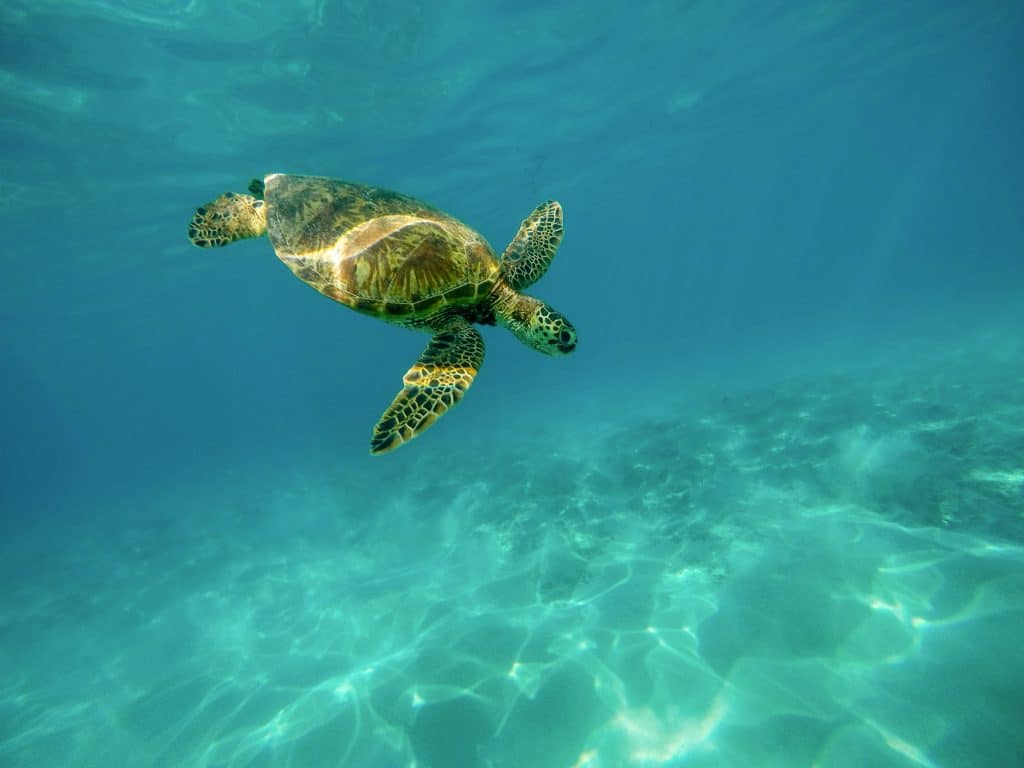
Scuba Diving in Costa Rica – Summary
Costa Rica is not just one of the best tourist destinations, but it is also one of the best diving destinations.
The best dive sites in Costa Rica are located on the islands, away from the coastline, not near the beaches.
You can find good dive sites near the beach, mainly in the north. Although the amount of life you will find, and the visibility is less than on the islands.
The best dive sites in Costa Rica are the Murciélago Islands, Catalinas Islands, and Caño Island.
The most recommended scuba diving site is Caño Island, because it is located closer to the capital, the price is good and the amount of marine life that can be seen is really impressive.
For this reason Caño Island is called the “Miniature Cocos Island”
If you want to know this diving paradise, send us a message. We will be happy to help you.
